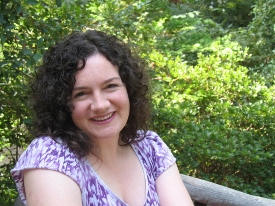
Collisions
Contributor’s Marginalia: Angie Macri on “Aquacade” by Sarah Crossland
When I see a poem set in New York City in the 1930s, I read it because of my dad. He was born in Brooklyn in 1934. I doubt that he went to the World’s Fair or saw the Aquacade, but I’ll never know for sure. He has Alzheimer’s now, and he never talked about growing up much, probably because he lost his mom to cancer when he was young. Often I find myself imagining his life in New York from the scraps that he and cousins have told me, from the few unlabeled photos that I have. When I see a poem like this, right or wrong, it adds images to that blank space.
Where I grew up, New York was something not to talk about. I was accepted in our rural community because my mom’s family had lived there for centuries, but it was odd that my father was from somewhere else, that he spoke funny, that his last name was one that no one had ever heard of before. We were I(EYE)talian. When I was a little girl, I asked my grandmother how she felt when my mom and dad got married, and she told me that of course she’d been worried because he was Catholic and from the big city. When I asked my father about it, he was at a loss for words. I didn’t want to risk hurting his feelings or making him remember what he needed to forget, and I didn’t know how to fit the parts of me together. He just seemed to want to leave New York behind, and I respected that. I was ready to leave small town southern Illinois, too.
So I don’t know if my father ever saw the Aquacade, although I know that he swam like a champion, having spent summers on Long Island. I don’t know if he ever saw the show detailed in this poem, although I know that he thought Aquacade-turned-movie-star Johnny Weissmuller fantastic just like I did. I know that he often saw movies when he was a kid and so maybe he saw what this poem shows in that way.
But what I see in this poem are not only glimmers of what might have been part of my father’s world but what I have felt and wanted to ask but never have so clearly: “What happens when we collide with a pattern / new to us?” This poem is great because it builds on images to such a vital question, and what this poem shows is that that apparent collision—of different people, places, ideas—doesn’t have to be a problem. In fact, as the poem says, “a body always lends / itself to rhyme.” For all the propensity of any group to be offhand at best or cruel at worst to what is perceived as The Other, this poem celebrates the strength and grace and risk in intersections that can lead to beauty. “[W]e’re all the same when we begin to move,” the poem ends. I am the woman swimming in the poem. No matter who you are, you are swimming, too. I am in the audience watching, applauding. You are sitting by me, too. When I read this poem, I remember I’m not alone.
